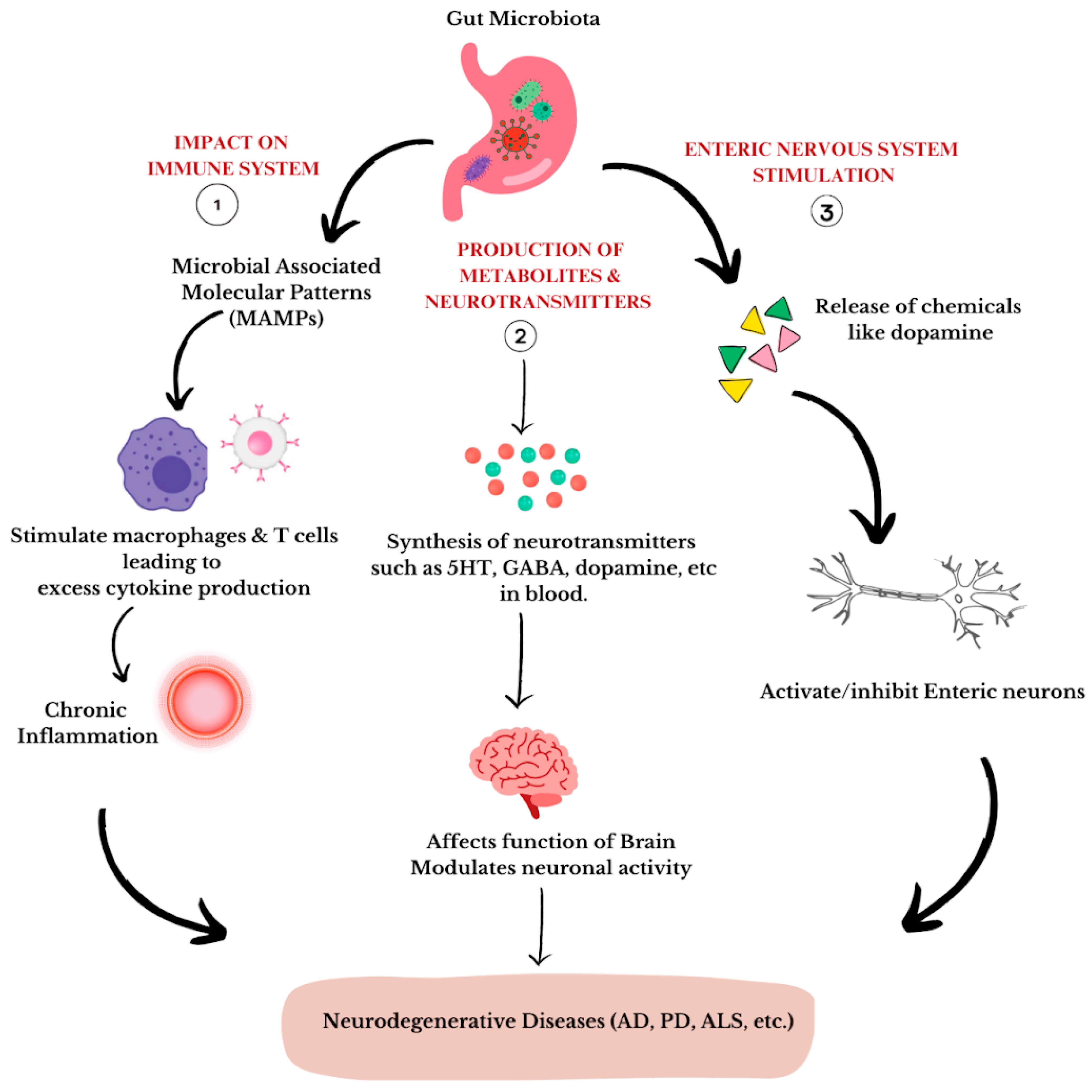The human gut harbors a diverse and dynamic microbial community, collectively known as the gut microbiota, which plays a pivotal role in various physiological processes. Recent research has highlighted the intricate interaction between the gut microbiota and human health, particularly its impact on neurodegenerative diseases. This report aims to explore the complex interplay between gut microbiota dysbiosis and the development of neurodegenerative illnesses, such as Alzheimer’s disease (AD), Parkinson’s disease (PD), Huntington’s disease (HD), and amyotrophic lateral sclerosis (ALS).
Gut Microbiota and Neurodegenerative Diseases:
The makeup of the gut microbiome significantly influences brain function through the gut-brain axis (GBA). Dysbiosis, characterized by alterations in gut microbiota composition, has been implicated in the pathogenesis of neurodegenerative diseases. Bidirectional communication between the gut and the brain occurs via various channels, including neurotransmitters and metabolites produced by gut bacteria.
Neurodegenerative Diseases and Gut Microbiota Dysbiosis:
a. Alzheimer’s Disease (AD):
- Accumulation of amyloid beta (Aβ) and neurofibrillary tangles leads to neuroinflammation and synaptic loss.
- Dysbiosis in AD patients is associated with reduced microbial diversity, altered Firmicutes/Bacteroidetes ratio, and specific bacterial population changes.
- Bacterial amyloids, such as curli produced by E. coli, may induce endogenous neuronal amyloid formation, exacerbating AD pathology.
- Fecal microbiota transplantation (FMT) from healthy donors shows promise in reducing neuroinflammation and cognitive decline in AD.
b. Parkinson’s Disease (PD):
- α-synuclein aggregation in the CNS is a hallmark of PD pathology, with gut involvement in disease progression.
- Constipation, a common PD symptom, correlates with α-synuclein buildup and gut inflammation.
- LRRK2 mutations and microbiota exposure influence PD development, highlighting the role of gut microbiota in modulating disease risk.
- FMT therapy and modulation of gut microbiota composition offer potential therapeutic strategies for PD management.
c. Huntington’s Disease (HD):
- Mutation in the HTT gene causes progressive degeneration of brain nerve cells in HD.
- GI dysfunction, including diarrhea and malabsorption, is associated with mHTT accumulation in the GI tract.
- Altered gut microbiota composition and increased intestinal permeability contribute to HD symptoms.
- FMT from healthy donors improves cognitive function in HD mice, suggesting a therapeutic avenue.
d. Amyotrophic Lateral Sclerosis (ALS):
- Motor neuron degeneration and neuroinflammation characterize ALS pathology.
- C9ORF72 mutation, a common genetic variant in ALS, influences gut microbiota composition and pro-inflammatory response.
- Reduced microbial diversity and pro-inflammatory gut microbiome are observed in ALS patients.
- Butyrate-producing bacteria and FMT show potential in mitigating ALS progression in preclinical studies.
Therapeutic Approaches:
a. Antibiotics, probiotics, prebiotics, and FMT offer promising therapeutic avenues for modulating gut microbiota and mitigating neurodegenerative diseases.
b. Restoration of gut microbial balance through targeted interventions may alleviate neuroinflammation, oxidative stress, and neuronal damage associated with neurodegenerative illnesses.
Future Directions:
a. Comprehensive understanding of the gut-brain axis and its modulation by gut microbiota holds promise for developing novel therapeutic strategies for neurodegenerative diseases.
b. Further research is warranted to elucidate the molecular mechanisms underlying the interaction between gut microbiota dysbiosis and neurodegeneration.
c. Large-scale, multi-omics studies are needed to identify potential biomarkers and therapeutic targets for personalized treatment approaches.
The gut microbiota plays a crucial role in the pathogenesis and progression of neurodegenerative diseases through the gut-brain axis. Dysbiosis-induced neuroinflammation, oxidative stress, and neuronal damage contribute to disease development. Therapeutic interventions targeting gut microbiota offer potential avenues for mitigating neurodegenerative diseases. Future research should focus on unraveling the molecular mechanisms underlying gut-brain communication and developing personalized treatment strategies based on gut microbiota modulation.
Link to the article : https://tinyurl.com/35fzmckr
